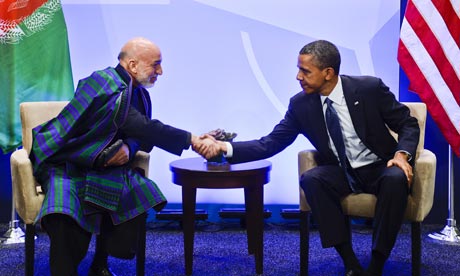Obama and Karzai outline post-2014 Afghanistan vision at Nato summit
![]()
US president urges Afghan counterpart to implement electoral reform, cut out corruption and press Taliban for settlement
Ewen MacAskill in Chicago

Afghanistan president Hamid Karzai reaffirmed his support for the timetable of withdrawal. Photograph: Shawn Thew/EPA
Barack Obama pressed the Afghanistan leader Hamid Karzai at the Nato summit in Chicago on Sunday to engage with greater urgency in secret talks with the Taliban about a political settlement.
Obama also urged Karzai to implement electoral reforms to cut down in the 2014 presidential election the kind of corruption that tarnished Karzai’s re-election in 2009.
The pair were speaking at the opening of a two-day Nato summit in Chicago aimed at drawing up detailed plans for the withdrawal of the US-led, 130,000-strong international force by the end of 2014, and for a more modest presence beyond that date.
After their meeting, Karzai reaffirmed his support for a timetable, which requires the Afghan army to take over the lead in combat by the middle of next year.
Karzai added that he was “very much looking forward to an end to the war” and the day when Afghanistan would “no longer be a burden on the world”.
Obama said the Nato summit was about “painting a vision, post-2014, in which we have ended our combat role, the Afghan war as we understand it is over, but our commitment to friendship and partnership with Afghanistan continues.”
He added: “Both of us recognise that we still have a lot of work to do. The loss of life continues in Afghanistan. There will be hard days ahead, but we’re confident that we’re on the right track.”
Public weariness with the war has grown in the US and in other countries among the 50-strong international coalition.
Almost all international forces are scheduled to be out by the end of 2014 after helping to maintain security for the presidential elections that year. Karzai has said he will not be standing again.
The Obama administration had hoped Chicago would be the venue for a major announcement of a political settlement with the Taliban. But these hopes crumbled when the Taliban walked away from reconciliation talks in March.
Secret talks have since been resumed, according to US officials. But Karzai, facing internal political opposition to the idea of reconciliation, has been reluctant to reach a deal.
Obama flew to Chicago on Saturday night after 24 hours of negotiation with the leaders of the G8 at the presidential retreat Camp David which was dominated by the euro-zone crisis but also addressed issues such as Afghanistan.
As well as pressing Karzai on a political settlement, Obama is having to focus on keeping the international force together, with some countries already preparing to leave early.
The new French president, François Hollande, is standing by a pledge to end French involvement in combat operations at the end of this year. But he has offered a compromise that would see many of the troops remain in Afghanistan beyond that date in other roles.
The head of Nato, Anders Fogh Rasmussen, promised on Sunday that the French decision would not precipitate a sudden exodus by other countries.
“There will be no rush for the exits,” Rasmussen said. “Our goal, our strategy, our timetable remain unchanged.”
Rasmussen predicted a compromise would be reached that will see France move into a non-combat role in support of the international mission.
After the 2014 pullout, a Nato force will be left behind, in part to help with training. No figure has yet been announced but US commanders in Kabul have spoken of around 15,000-20,000 personnel.
Announcements about contributions from Nato countries towards the $4.1bn needed to finance that force for ten years are to be made at the Nato summit.
Among the contributions, Britain is promising to provide $110m a year, Germany $200m and Australia $100m. The US is to take up the bulk of the costs, anything from between 50% and 75%. Obama is also planning to speak on the sidelines of the Nato summit with the Pakistan president Asif Ali Zardari.
The US and Pakistan are engaged in negotiations about re-opening a supply route to Afghanistan through Pakistan closed in protest over the killing of Pakistan troops in a US air strike.
The White House national security spokesman Ben Rhodes, briefing reporters on a flight to Chicago, predicted the issue of the border closure would be resolved soon. Although the US-led forces are able to transport supplies though alternative routes from the north of Afghanistan, it is more expensive.
“On the supply lines, we believe that this is going to be resolved. There have been positive steps, statements made by the Pakistanis, and we’re currently negotiating the opening of the supply lines with them; we expect that to take some time. So there is still work to be done through those negotiations,” Rhodes said.
“We’re not anticipating necessarily closing out those negotiations this weekend.”
Related Articles
Obama and Rouhani at the UN
![]()
Collision of Two Worlds Obama in his address to the United Nations, Sept. 24, treated the world to a display
E. Coli Outbreak Linked to Aggressive New Strain
![]()
Mutant Bacteria The director of Lübeck’s University Medical Center Schleswig-Holstein (UK-SH) exhibits the new strain of E. coli on Wednesday.
El ataque a Siria Las mentiras y el proyecto
![]()
Estados Unidos se apresta a propinar un severo escarmiento a Siria, cuyo gobierno es acusado de haber cruzado la fatídica


